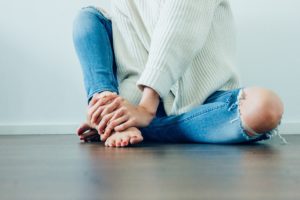- Calls to this hotline are currently being directed to Within Health, Fay or Eating Disorder Solutions
- Representatives are standing by 24/7 to help answer your questions
- All calls are confidential and HIPAA compliant
- There is no obligation or cost to call
- Eating Disorder Hope does not receive any commissions or fees dependent upon which provider you select
- Additional treatment providers are located on our directory or samhsa.gov
Are Your Clothes Hurting Your Body Image? Challenging Clothes Size

Many individuals who have struggled with an eating disorder also commonly have a difficult time learning to embrace their body, whatever their size may be.
Often as a result of drastic eating disorder behaviors, a person with an eating disorder, such as anorexia, bulimia, and binge eating disorder, may have some degree of body dysmorphia, in which they perceive flaws about their body that are not in fact actually there.
Learning to accept a changing body in eating disorder recovery is incredibly challenging and can take months, even years, to fully come to peace with body image.
Working With Clothing
One aspect that can be particularly challenging through the eating disorder recovery is adjusting clothes as the body changes. Many individuals notice fluctuations with their body as they go through recovery, especially as the body adjusts to normalized eating behaviors and a person is no longer engaging in compensatory mechanisms.
Often times, old clothes are kept and used as a means of body-checking, or measuring if weight has been gained or not. It is not uncommon for clothes to be used in way that fuels the eating disorder, especially if a person gauges their “success” with their eating disorder by what clothes or size they might be able to fit in.
In order to fully be able to heal and recover from an eating disorder, it is especially important to learn to let go of any such clothes that were used for these purposes. Even the sight of these clothes can be triggering, which can be damaging for a person who is feeling vulnerable in the recovery process. Keeping old clothes that were part of the eating disorder is like holding a lifeline to the disease itself, and this is contradictory to the recovery process itself.
Learning to Move On
 Moving on by letting go of old clothes is easier said than done. If you have found yourself harboring old clothes from your eating disorder, this may be something you want to process with the help of your therapist, counselor, and/or support group. Having accountability can make it easier to follow through with your commitment to recovery and letting go of old clothes.
Moving on by letting go of old clothes is easier said than done. If you have found yourself harboring old clothes from your eating disorder, this may be something you want to process with the help of your therapist, counselor, and/or support group. Having accountability can make it easier to follow through with your commitment to recovery and letting go of old clothes.
Practicing extra self-care during this time can be helpful as you learn to love and embrace the body you have. Consider going shopping with loved ones who understand and support your situation, and find clothes that you like and that help you feel comfortable in your body.
Remember to be gentle with yourself and know that ultimately, letting go of old clothes can be a powerful step for moving forward.
Community Discussion – Share Your Thoughts Here!
What do you think is most difficult about letting go of old clothes used during an eating disorder?
 About the Author: Crystal is a Masters-level Registered Dietitian Nutritionist (RDN) with a specialty focus in eating disorders, maternal/child health and wellness, and intuitive eating. Combining clinical experience with a love of social media and writing, Crystal serves as the Director of Content and Social Media for Eating Disorder Hope/Addiction Hope, where her passion to help others find recovery and healing is integrated into each part of her work.
About the Author: Crystal is a Masters-level Registered Dietitian Nutritionist (RDN) with a specialty focus in eating disorders, maternal/child health and wellness, and intuitive eating. Combining clinical experience with a love of social media and writing, Crystal serves as the Director of Content and Social Media for Eating Disorder Hope/Addiction Hope, where her passion to help others find recovery and healing is integrated into each part of her work.
As a Certified Intuitive Eating Counselor, Crystal has dedicated her career to helping others establish a healthy relationship with food and body through her work with EDH/AH and nutrition private practice.
The opinions and views of our guest contributors are shared to provide a broad perspective of eating disorders. These are not necessarily the views of Eating Disorder Hope, but an effort to offer discussion of various issues by different concerned individuals.
We at Eating Disorder Hope understand that eating disorders result from a combination of environmental and genetic factors. If you or a loved one are suffering from an eating disorder, please know that there is hope for you, and seek immediate professional help.
Last Updated & Reviewed By: Jacquelyn Ekern, MS, LPC on February 10, 2017
Published on EatingDisorderHope.com

The EatingDisorderHope.com editorial team comprises experienced writers, editors, and medical reviewers specializing in eating disorders, treatment, and mental and behavioral health.

